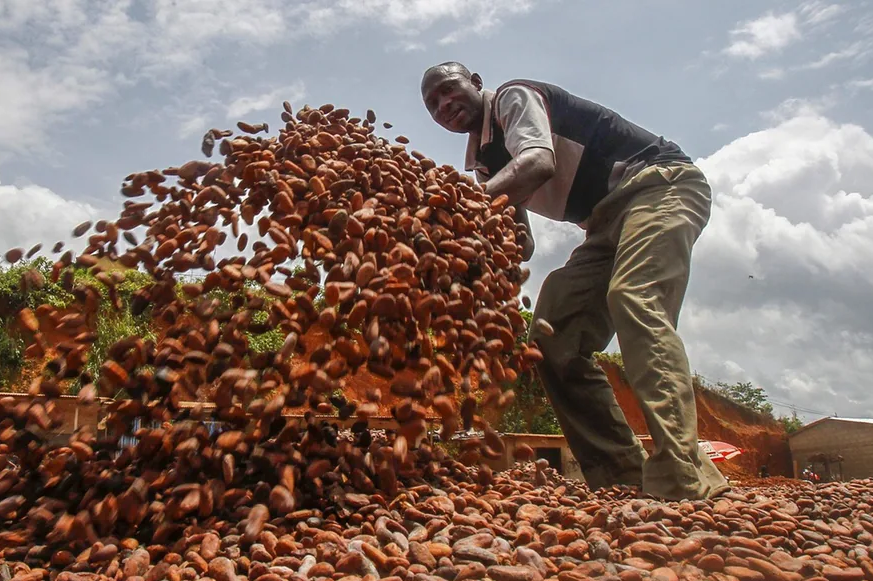Farmers are now getting lower prices for their crop even though a living wage premium was introduced. Keystone / Legnan Koula Farmers in Ivory Coast – the world’s largest cocoa-producing nation – are getting less for their cocoa despite the introduction of a payment that aims to secure them a living wage. The West African nation of Ivory Coast accounts for around 45% of the world’s cocoa production that brings in export revenue of .5 billion (CHF3.2 billion) a year. But cocoa farmers in the country make just %excerpt%.78 per day, a third less than what the organisation Fair Trade International calls a living wage – .51 per day. To address this, in 2019 Ivory Coast (along with Ghana) decided to charge an extra 0 per ton of cocoa exported to places like Switzerland
Topics:
Swissinfo considers the following as important: 3.) Swissinfo Business and Economy, 3) Swiss Markets and News, Business, Featured, newsletter
This could be interesting, too:
Nachrichten Ticker - www.finanzen.ch writes Die Performance der Kryptowährungen in KW 9: Das hat sich bei Bitcoin, Ether & Co. getan
Nachrichten Ticker - www.finanzen.ch writes Wer verbirgt sich hinter der Ethereum-Technologie?
Martin Hartmann writes Eine Analyse nach den Lehren von Milton Friedman
Marc Chandler writes March 2025 Monthly

Farmers are now getting lower prices for their crop even though a living wage premium was introduced. Keystone / Legnan Koula
Farmers in Ivory Coast – the world’s largest cocoa-producing nation – are getting less for their cocoa despite the introduction of a payment that aims to secure them a living wage.
The West African nation of Ivory Coast accounts for around 45% of the world’s cocoa production that brings in export revenue of $3.5 billion (CHF3.2 billion) a year. But cocoa farmers in the country make just $0.78 per day, a third less than what the organisation Fair Trade International calls a living wage – $2.51 per day.
To address this, in 2019 Ivory Coast (along with Ghana) decided to charge an extra $400 per ton of cocoa exported to places like Switzerland as a so-called Living Income Differential (LID) meant to increase the growers’ share of the profits and buffer them from volatile prices. The new policy came into force during the 2020/2021 cocoa harvest season.
The cocoa board of Ivory Coast (Le Conseil du Café-Cacao) fixed the minimum farmgate price of cocoa for its main crop (October-March harvest) at CFA1,000 per kg of which was almost 20% higher than the previous year. This brought in an extra CFA500 billion (around CHF826.5 million) for farmers during the season.
Bigger picture
In the beginning, Ivorian cocoa farmers got more money thanks to the introduction of the LID. But the move was not without negative consequences. Last November, the cocoa board lashed out at alleged attempts by big international buyers to reduce purchases to avoid paying the LID. For example, it accused commodity firm Olam of reducing its share of Ivorian and Ghanaian cocoa, chocolate company Mars of doubling cocoa butter in its products, and confectioner Hershey of buying cocoa beans from the futures market instead of physical sellers at the current price – all to avoid paying the extra levy.
Swiss companies, on the other hand, appear to be on board. Chocolate maker Lindt & Sprüngli confirmed that they “have already purchased cocoa with full LID pricing and will be continuing to do so” but did not wish to reveal specifics. Chocolate manufacturer Barry Callebaut, that buys around a million tons of cocoa beans a year, said its share of cocoa from Ivory Coast had remained stable since the introduction of the pricing scheme.
Food giant Nestlé was the only one to disclose both share and volumes. Its share of West African cocoa has remained stable (a little under half of total direct cocoa purchases) over the last four years and it plans to buy an additional 40,000 tons from the Ivory Coast in the 2021/2022 season.
Falling demand dampens effects
Nonetheless, despite the LID, a drop in global demand for cocoa beans at the end of 2020 put Ivory Coast in a difficult position. The higher priced cocoa has put buyers off from signing purchase contracts. In February, to drum up purchases, it was forced to slash a quality premium (known as country differential) resulting in a discount that neutralised the surplus earned through the LID.
In addition, the Covid pandemic pushed the Ivorian cocoa board to reimburse a little over CFA10.5 billion (around CHF17.5 million) to 80 exporting firms, including international ones, from the LID payments meant for farmers. This was justified as necessary due to the impact of the Covid-19 pandemic in export markets like Switzerland. The decision caused controversy because people felt that foreign firms were being bailed out while the margins of local players in the supply chain were being squeezed.
The situation became so untenable that cocoa farmers, who were only just beginning to enjoy the fruits of the LID, could no longer be protected from what was happening in the global marketplace. The minimum farmgate price for the April-September mid-crop harvest was dropped to CFA750 per kg. This was even lower than the pre-LID price of CFA825 per kg for the 2019/2020 crop.
Due to many factors, including the pandemic, the LID seems to have only brought a short-term price hike for farmers in West Africa. But without it, they would likely be in an even more precarious situation now, according to the Ivorian cocoa board which admitted that without the LID the farmgate price would have fallen as low as CFA500 per kg, a historic low.
What now?
The LID experiment shows that the instrument can at best serve as a buffer during lean times. The price a farmer gets is still strongly linked to global supply and demand, and there is little that producer countries like Ghana and Ivory Coast can do about it except join forces to reduce supply. Proof of this lay in the cocoa board’s April announcement of the latest cocoa price.
“Mr. Yves Brahima Koné [chair of the cocoa board] invited cocoa producers to limit production if they want better prices in the future”, the announcement read.
Unfortunately, the LID may have encouraged farmers to plant more cocoa which could mean even lower prices this year unless Covid-depressed international demand picks up. Is there a way out of this boom and bust cycle?
“Fairtrade believes it is time for consuming country governments to show solidarity with producing country governments and farmers,” says Jon Walker, senior adviser on cocoa at Fairtrade.
According to him, due diligence regulations for companies – currently being discussed in the European Union and recently put to the ballot (and narrowly rejected) in the form of the “Responsible Business Initiative” in Switzerland – offer a window of opportunity to make paying a living income mandatory.
“If the human right to a living income cannot be recognised, then how will all other human rights of cocoa farming families be met in a sustainable way?,” he says.
Tags: Business,Featured,newsletter








